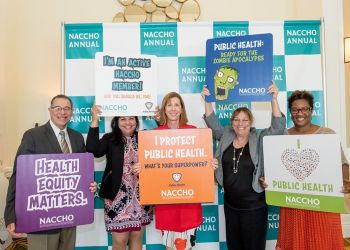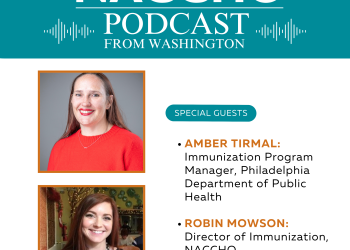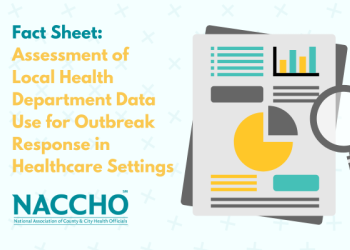Washington, DC, November 7, 2023 – Today, the Centers for Disease Control and Prevention (CDC) released a new report calling for urgent action to stop the increase of newborn syphilis cases. The data, featured in CDC Vital Signs, shows that in 2022, there was a significant surge in cases of syphilis in newborns, or congenital syphilis affecting communities nationwide, with a disproportionate impact on marginalized populations. More than 3,700 babies were born with syphilis in 2022 – a ten-fold increase over the last decade. Timely testing and treatment during pregnancy might have prevented almost 9 in 10 (88%) cases in 2022.
“The new CDC data highlight what our local health departments across the country are seeing firsthand—syphilis cases are on the rise with dire consequences, particularly for those who are pregnant and their newborns,” said Lori Tremmel Freeman, Chief Executive Officer at NACCHO. “With the alarming statistic showing that over 70% of the US population lives in communities with high rates of syphilis, it is imperative local health departments, health care providers, and other key community entities work together to implement a comprehensive and swift response. This includes bolstering testing efforts and ensuring immediate access to treatment. With sufficient resources and the buy-in of key community leaders and elected officials, we are confident that local health department officials can help lead their communities to move the needle on this growing crisis.”
Pregnant people and those living in high-risk communities are the most vulnerable, which the CDC report notes impacts more than 70% of the US population in 38% of US counties. Additionally, babies born to Black, Hispanic, or American Indian/Alaska Native mothers are significantly more likely to have newborn syphilis. As the report notes, disparities in syphilis rates by race and ethnicity are not explained by sexual behaviors but rather reflect access to healthcare, differences in sexual networks, and persistent and systemic racism in medical care. Screening based on geographic risk can decrease stigma and biases that are found with screening based on individual risk factors. Today’s report also emphasized the need for better access to care, as more than half of the people who tested positive for syphilis during pregnancy had not received adequate or timely treatment, and nearly 40% of the syphilis cases were among mothers who were not in prenatal care.
As a result, CDC recommends more rapid testing, coupled with immediate treatment for anyone pregnant with positive results as well as regularly screening sexually active people for STIs; these actions would be pivotal steps in helping to mitigate this crisis. They also call for the engagement of all providers in addressing rising rates of STIs; everyone in the healthcare system can play a role in improving access to syphilis testing and treatment for all people. This means immediately increasing access to prevention, testing, and treatment—in jails, pharmacies, urgent care facilities, and emergency rooms—anywhere that an individual engages with a healthcare provider.
“The congenital syphilis epidemic is an unacceptable American crisis. All pregnant mothers—regardless of who they are or where they live—deserve access to care that protects them and their babies from preventable disease,” said Jonathan Mermin, M.D., M.P.H., Director of CDC’s National Center for HIV, Viral Hepatitis, STD, and TB Prevention.
In addition to raising awareness of the issue and calling for a coordinated approach to address the problem, NACCHO has worked to bring awareness to the impact of drug shortages on treating syphilis in pregnant people. Last month, NACCHO sent a letter to the White House Drug Shortage Taskforce urging them to prioritize efforts related to the shortage of penicillin G benzathine (Bicillin L-A), which is the only treatment available to pregnant individuals with syphilis. Without intervention for greater pharmaceutical production, the situation will worsen.
###
About NACCHO
The National Association of County and City Health Officials (NACCHO), the voice of the country’s 3,000 local health departments, supports local health departments’ initiatives to promote healthy living in the communities they serve. NACCHO provides cutting-edge, skill-building, professional resources, and programs crafted to optimize health equity, and support effective local public health practice and systems. NACCHO is committed to continuing to make positive strides in the advancement of public health and supports like-minded opportunities for partnerships. For more information, visit the NACCHO website at www.naccho.org.





